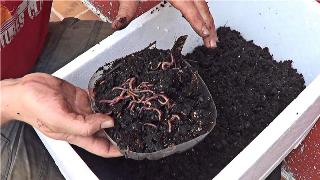Oct 24 2014
The contribution of home gardens in the preservation of biodiversity, economics and human health prompted a multidisciplinary group at the South Border College (Ecosur) in Mexico to work on a project in Tabasco, a south state of the country, with the aim to improve the production and environmental management of these plantations.

Although the research was conducted from different perspectives, head of research Esperanza Huerta Lwanga focused on the study of soil invertebrates because they are indicators of its quality.
"These organisms fulfill various functions,like allowing the soil to absorb processed organic matter such as leaves, wood, trunks and branches and with this nourishing crops; they also maintain an ecological balance capable of preventing the invasion of pests and provide greater fertility without using chemicals. This happens when growing different types of plants, allowing the existence of a wide variety of soil invertebrates" the researcher explains.
The project, which began in 2009 and was funded by the Ministry of Energy, Natural Resources and Environmental Protection (SERNAPAM), arises because home gardens are places where there is a wealth of soil. In total, the research team worked in 50 home gardens located in different physiographic regions of the state: mountains, coast, floodplain and hillocks.
"During the fieldwork I realized that the orchards whose owners had family harmony, were characterized by a rich vegetation and greater diversity of soil invertebrates was found. However, in other orchards we observed garbage instead vegetation and organisms, revealing a gap between people and nature, " relates Huerta Lwanga.
An important finding of this project was when the researcher found a anecic earthworm, initially thought to be a new species, however, it was only a new entry in the state of Tabasco. "Such organism is characterized by its vertical movements, thereby creating tunnels, helping to integrate the organic matter in the soil, aerating it and forming its structure," the researcher says.
Other species were also identified, like earthworms, ants, termites, centipedes, beetles, grasshoppers, cockroaches and woodlice, which may also be called "ecosystem engineers" (specifically earthworms, termites and some ants) because their activities modify the soil, enriching its productivity.
According to the researcher, it is important to note that the presence of such organisms does not mean that the garden is infested with pests. "If you let me live there, they fulfill their tasks and at the same time control their population because the variety of invertebrates generates food chains."
The pest problem, she says, appears when the land is handled as a monoculture. In these cases only one type of organisms thrives and rapidly increases in number and , because nobody eats them, they become a threat to the plantations.
The research results revealed that the coastal region was the one with more garbage, followed by the hillocks. "In the mountains we found healthy vegetation and a great variety of crops, high diversity of invertebrates and greater earthworm biomass, which was estimated at more than 33 grams per square meter," highlights Huerta Lwanga.
That amount is important because according to previous studies it was established that if biomass is equal or greater than 30 grams per square meter germination induction and plant growth are achieved.
Additionally, this project included environmental education, which was given by mini-workshops and training in the production of vermi-compost.
"At Ecosur, we designed a box for composting, which is equiped with a small mill and worms, where we place the fresh waste to be processed. A device like this was given to all farmers, but was only accepted by 47 percent of them," she sadly concludes. (Agencia ID)